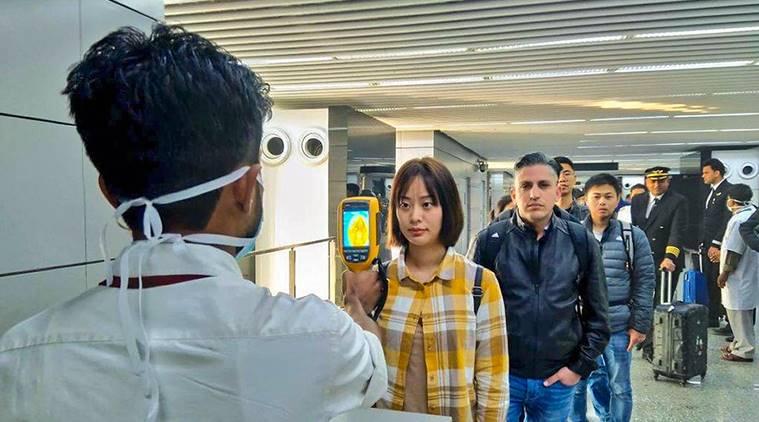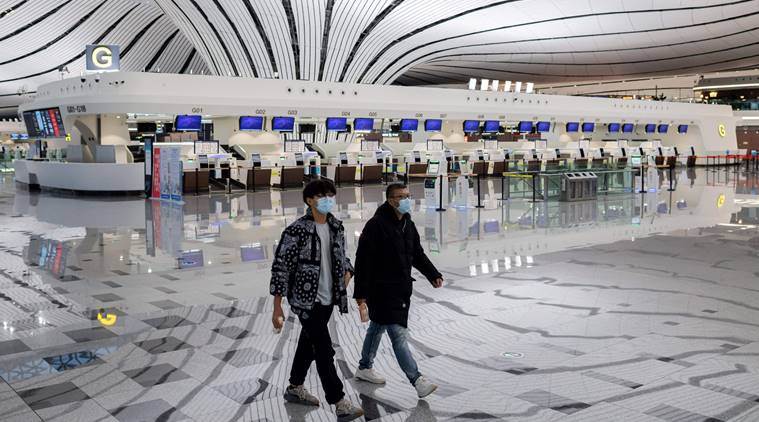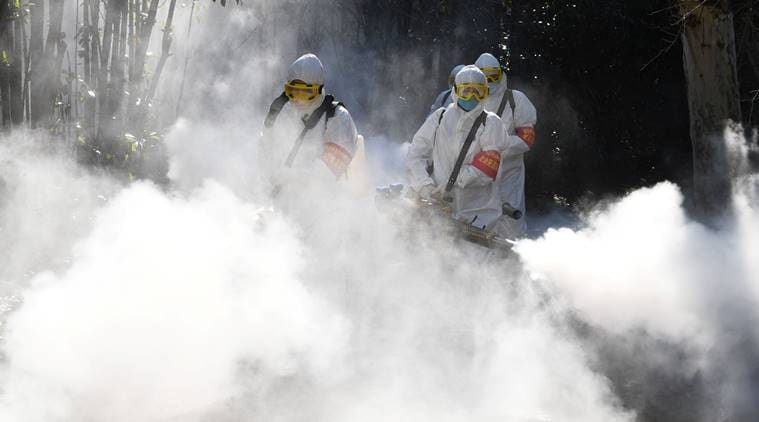 Passengers arriving via flights from 12 countries — Italy, Iran, China, Hong Kong, Japan, South Korea, Thailand, Singapore, Nepal, Indonesia, Vietnam and Malaysia — have to undergo compulsory screening. (File)
Passengers arriving via flights from 12 countries — Italy, Iran, China, Hong Kong, Japan, South Korea, Thailand, Singapore, Nepal, Indonesia, Vietnam and Malaysia — have to undergo compulsory screening. (File)
With one confirmed patient of coronavirus in Jaipur and six suspected cases from Agra, apart from the two infections reported Monday in Delhi and Hyderabad, the government Tuesday announced an additional measure to contain the outbreak: All international passengers to India will now have to submit self-declaration forms on arrival.
“Passengers of all international flights entering into India from any port are required to furnish duly filled self declaration form (including personal particulars i.e. phone no. and address in India) and travel history, to health officials and immigration officials at all ports,” stated the latest advisory. They will also have to provide details of the countries they visited and possible contact with other people there.
Currently, passengers arriving via flights from 12 countries — Italy, Iran, China, Hong Kong, Japan, South Korea, Thailand, Singapore, Nepal, Indonesia, Vietnam and Malaysia — have to undergo compulsory screening at 21 airports.
The Directorate General of Civil Aviation (DGCA) has also decided to suspend with immediate effect all regular visas and e-visas issued to nationals of Italy, Iran, South Korea and Japan issued on or before March 3 and have not entered India yet.
All international passenger arrivals on watchlist as coronavirus cases rise blood samples had been sent to the National Virology Institute in Pune, had contracted the infection. The three new confirmed cases, including the two in Delhi and Hyderabad, are currently stable, sources told The Indian Express.
Explained | How to handle COVID-19 scare
In Jaipur, 24 persons, including 21 other Italian tourists and three Indians — a bus driver, conductor and tourist guide — who had contact with the patient, have been shifted to the ITBP facility in Delhi’s Chhawla for testing. “Depending on the result, future course of action will be taken,” an official said.
In Hyderabad, at least 88 people whom the patient, a 24-year-old engineer at a global computer technology firm, came in contact with, and about 12 in Bengaluru, where he arrived from Dubai on February 20 before travelling to Hyderabad by bus a day later, have been traced.
The six new suspected cases in Agra are members of the extended family of the Delhi patient, who is a 45-year-old man from Mayur Vihar.
 Airports and airlines have been advised to comply with the travel advisory issued for passengers by the Bureau of Immigration
Airports and airlines have been advised to comply with the travel advisory issued for passengers by the Bureau of Immigration
“There is no move at the moment to administer the drugs for which approval has been obtained for use in case of a corona-related public health emergency. The earlier three cases (in Kerala) recovered without administration of the drugs. Family members and immediate contacts in the three new cases have been quarantined while contact tracing is on,” sources said.
With a total of six cases being confirmed since the first infection was reported on January 30, Prime Minister Narendra Modi said he had conducted “an extensive review regarding preparedness”, and that “there is no need to panic”.
“Different ministries & states are working together, from screening people arriving in India to providing prompt medical attention…We need to work together, take small yet important measures to ensure self-protection,” Modi posted on Twitter.
In a review meeting chaired by the Cabinet Secretary, all states were asked to increase quarantine capacity and “augment isolation wards and include facilities of the Labour department, armed forces, paramilitary forces, medical colleges and PSUs within their jurisdiction.”
The Ministry of Civil Aviation (MoCA) said that Pradeep Singh Kharola, secretary, MoCA, and Arvind Singh, chairman, Airports Authority of India (AAI), “conducted a video conference with all the airports to review & guide the preparations to take effective steps for preventing the spread of COVID-19”.
Airports and airlines have been advised to comply with the travel advisory issued for passengers by the Bureau of Immigration, it said.
 Sanitation workers disinfect a residential compound, as the country is hit by an outbreak of the novel coronavirus, in Bozhou, Anhui province, China (Reuters)
Sanitation workers disinfect a residential compound, as the country is hit by an outbreak of the novel coronavirus, in Bozhou, Anhui province, China (Reuters)
Italy, Iran, South Korea and Japan are among the hardest-hit by the virus after China, where the first case was reported in December. Visas granted to Chinese nationals had been suspended in February. The fresh government order does not apply to diplomats, Overseas Citizens of India and air crew — they will have to undergo mandatory medical examination.
The circulars were issued after it emerged that the patient in Delhi had arrived on February 25 on an Air India flight from Vienna in Austria, a country previously not on the government’s list of nations for mandatory screening, a senior official told The Indian Express.
Budget airline IndiGo, which ferried the Hyderabad patient from Dubai to Bengaluru, asked its crew to be placed in home observation immediately, with effect from March 2.